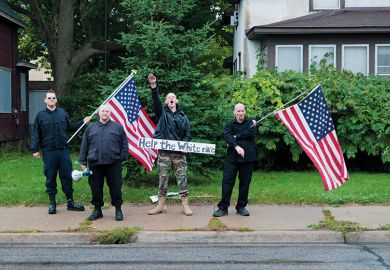Three US universities have blocked planned appearances on their campuses by the white supremacist Richard Spencer as disgust over far-right violence in Charlottesville prompts institutions to take a stronger stance.
Mr Spencer, who leads the National Policy Institute, a white nationalist thinktank, had previously outlined plans to target college campuses.
Colleges, particularly ones supported by public funding, have often felt bound to pay close regard to First Amendment rights to free speech, even for widely vilified or racist speakers such as Mr Spencer. But disgust at the far-right protest held at the University of Virginia campus in Charlottesville – against plans to remove a Confederate monument in the city – and the killing of peaceful counter-protester Heather Heyer has led to a change of stance.
W. Kent Fuchs, president of the University of Florida, where Mr Spencer had planned to speak on campus in Gainesville in September, said in a Facebook message on 16 August: “Amid serious concerns for safety, we have decided to deny the National Policy Institute’s request to rent event space at the University of Florida.”
He said that the decision had been “made after assessing potential risks with campus, community, state and federal law enforcement officials following violent clashes in Charlottesville” and in light of calls online for further violence in Gainesville.
“I find the racist rhetoric of Richard Spencer and white nationalism repugnant and counter to everything the university and this nation stands for,” Professor Fuchs said.
“That said, the University of Florida remains unwaveringly dedicated to free speech and the spirit of public discourse. However, the First Amendment does not require a public institution to risk imminent violence to students and others.”
Michigan State University subsequently said in a statement that it would refuse a request to hire space for a speaker from the National Policy Institute. “This decision was made due to significant concerns about public safety in the wake of the tragic violence in Charlottesville last weekend,” it said. “While we remain firm in our commitment to freedom of expression, our first obligation is to the safety and security of our students and our community.”
Meanwhile Louisiana State University president F. King Alexander said that Mr Spencer was “not welcome” on campus.
“We will take the necessary precautions to ensure that our campus is safe from violence, that our students and faculty are safe from people trying to stir up troubles,” he added.
Events in Charlottesville have also turned the spotlight on to what universities and colleges should do with Confederate monuments located on campuses, as the Chronicle of Higher Education has reported.
A monument at the University of North Carolina at Chapel Hill, was draped in a black hood in response to the Charlottesville violence. But as it is a state monument, the university may not legally remove it, UNC officials have said.
At Duke University in Durham, North Carolina, a statue of the Confederate general Robert E. Lee has been vandalised. “Each of us deserves a voice in determining how to address the questions raised by the statues of Robert E. Lee and others, and confront the darker moments in our nation’s history,” said Vincent Price, the university’s president, in a statement.
But Bronx Community College in New York has said that it will remove the busts of Confederate generals from its Hall of Fame for Great Americans.
Register to continue
Why register?
- Registration is free and only takes a moment
- Once registered, you can read 3 articles a month
- Sign up for our newsletter
Subscribe
Or subscribe for unlimited access to:
- Unlimited access to news, views, insights & reviews
- Digital editions
- Digital access to THE’s university and college rankings analysis
Already registered or a current subscriber?






